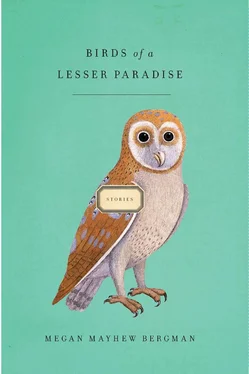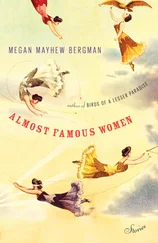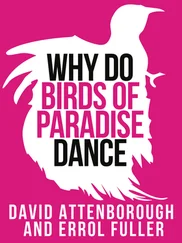If I can’t convince you to come down and get out of the sun, I said, I’m going inside to call the Senior Center.
Make sure he has enough water, Link said. And tell him I’ll need him up on the roof later to supervise.
Fat chance, I said, unless you rig a harness with a sunshade.
Link smiled.
I know, I said. You can. But don’t.
I poked my head into the living room to look at Dad. He was blank-eyed, his favorite game show on full volume. He liked to watch shows where competitors used their wits to survive or complete daring physical tasks — drinking raw ostrich eggs from a glass, rappelling down skyscrapers, escaping from Plexiglas cages underwater. He liked to see fear, mainly because he still thought he was the kind of man who could avoid it; he’d maneuver his way through adversity with ex — Navy Seal cleverness.
I phoned the Senior Center.
My father would like to take Susan fishing, I said.
We can’t allow that, the director said. There are no unsanctioned visits. The liabilities.
I’ll supervise, I said. What’s the big deal? They’ve been together for a month. They need to switch up the routine, keep things fresh.
I can’t give you permission, the director said. Plus, what’s there to fish for anymore?
I called Susan’s son.
What do you think about Susan fishing with my dad this afternoon? I said. A change of pace. My partner and I will take them out. You’ll just have to drive Susan to Higgins Beach.
I don’t know, he said. Susan’s son was an antiques dealer who had always struck me as squeamish, but my judgment of men was harsh — the curse of being raised by a survivalist father.
It would really mean something to Dad, I said. He enjoys fishing so much; he’d like to share it with her.
Do they even know the difference between the Senior Center living room and the beach? he asked.
On a good day, I said.
A half hour, he said. Mom can’t take much sun time. I’ll send her with an umbrella and a pound cake.
I hung up and found Dad awake and hungry in the living room. He was a foulmouthed infant, needy and irritable.
It’s hot, he said.
Stay hydrated, I said.
I don’t want to waste the water, he said.
Drink it then, I said, pushing his cup toward him.
Paul McCartney, Dad said, advocated vegetarianism, but I don’t see how that helps the workingman, the man bolting up one of them cars in Detroit.
Men haven’t made cars in years, Dad, I said. And Paul McCartney is really dead this time.
What we all need, he said, is a little self-sufficiency, less flatulence. Fuel ourselves. Remember LeBron James? He’s giving schoolkids the old razzle-dazzle, trying to sell us the Chinaman’s leather shoes.
LeBron is almost seventy. You need a nap, I said, escorting him to his bedroom, where again I strapped him into bed to keep him from falling and breaking another hip. Getting him settled was an exhausting process for both of us, one that sometimes confused and hurt him. Why are you trapping me? he’d ask. Why am I tied into my own bed? Sometimes he would pull off his diaper, or lie with his blank eyes fixated on the ceiling, making me lean down into his face to check his breath like a new mother, assure myself that he was still alive.
Stay here with me for a minute, he said, gripping my upper arm.
I paused and held his hand, half loving, half impatient.
Can we go fishing when I wake up? he said.
Yes, I said. With Susan.
Who’s Susan? he said.
Your girlfriend, I said.
Do I love her? he said.
You tell me, I said.
Yes, he said. I’m taking her fishing today. Link will help me set up the rods, won’t he?
Of course, I said. We’ll meet Susan at the beach at four.
Link and I roused Dad at three and assembled our gear. It took us less than ten minutes to walk to Higgins Beach. Link ran ahead to set things up while I walked with Dad, holding him by the arm. He was moving more slowly than usual.
Your feet hurting? I asked.
Hmm? he said. He didn’t hear well, despite the cochlear implant.
Are your feet hurting? I asked, louder.
Everything hurts, he said. And then he laughed, but it was not a funny laugh, it was a sad laugh, the kind of tired laugh an old person uttered for lack of anything better to say. A laugh that said I pretend living is better than dying, but I’m never sure; I can’t think straight anymore. I can’t engage with your conversation. Where are we going? I’ll take the special.
Our neighborhood street was lined with palms, cinnecord and spider lily. Heat-stricken cats draped themselves across front porches; a skinny rooster crossed the road in front of us like a bad joke, then disappeared behind the tire of a parked truck to crow boldly. The tips of stucco resorts crowded the horizon. A bright orange tractor careened around old palms and trolled the length of the beach, its metal plow raking up dead fish and putrid sea grass. Rubber gloves, beer cans, cigarette butts, and dog shit littered the sand, which wasn’t natural sand — it was trucked in annually from a gravel pit. Dad once said Key Westers will stick a palm tree and a bar in any old dump and call it a resort.
Lately I’d found myself pausing on the public beach to watch the ocean, drawn to the dirty mass that, with its steady shore-slapping rhythm, deposited mounds of grasslike seaweed on the rocky coastline. Perhaps I was grieving it, the miles of water that had surrounded me my entire life, fed me, half drowned me as a child. To Dad, the ocean was the survivalist’s answer to every-thing — starvation, escape, autonomy. You ever find yourself in trouble, he’d say, you take one of them old houseboats from the marina out at night, paint over the name, and fish for a few weeks over one of the reefs or old wrecks. Call me, of course. I’ll be waiting. I’ll know.
Dad, I’d said. I don’t plan on getting into trouble.
No one ever does, he said. But live a little, sweetheart.
Sometimes I thought it would have pleased Dad if I’d amped up my inner butch a little more, tattooed my forearm to match a Harley, ran immigrants ninety miles from Havana to the Keys in the blue morning. Instead, I bought storefront space and served homemade crepes and Cuban coffee to tourists and read books in the off-season, dutifully cared for my father, sat with him for hours as he fished in the afternoons.
For years the ocean had been in decline — overfished, polluted, diseased — sea species genetically weakened and unable to thrive. But every so often Dad could pull out a fish or two — nothing you’d be wild about eating — or you’d hear of someone finding a school in the deepest pockets of water.
When I was a child, Dad had read the fish report aloud every morning, carefully reviewing water temperatures, tarpon migration patterns, anecdotes about how wrecks and reefs were fishing. He’d trail plain ballyhoo from the back of his johnboat for dolphin and sailfish. He liked old-school fishing. If he pulled up anything under sixty pounds, he’d bludgeon it with his beer bottle the way his father had taught him. Whenever I was in the boat I tried not to let him see me cry as I watched the fish struggle to survive. It’s a strange thing to see a man kill something he loves with a blank face, beating the life out of another being. But every few months we got a real fighter in the boat, a fish that flopped and tossed violently until it launched itself overboard, and I silently cheered it on as it swam away into the vast ocean and my father swore like the part-time sailor he was.
Susan’s son stood clutching his mother under an umbrella. Her face was covered in sunscreen; he hadn’t done a good job rubbing it into her skin. Her khaki pants were cuffed and her pedicured feet were bare. Her hair was pulled into a small ponytail at the nape of her neck. A visor covered her eyes. Her red lips were vibrant succulents between liver-spotted cheeks.
Читать дальше












